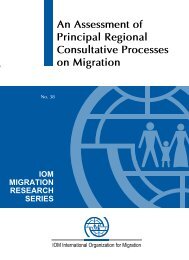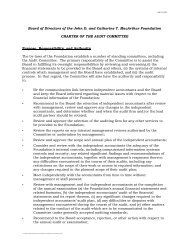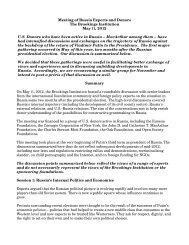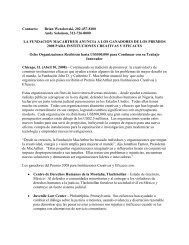A Global Compact on Learning - Brookings Institution
A Global Compact on Learning - Brookings Institution
A Global Compact on Learning - Brookings Institution
You also want an ePaper? Increase the reach of your titles
YUMPU automatically turns print PDFs into web optimized ePapers that Google loves.
y supporting promising and proven acti<strong>on</strong>s,<br />
such as those described in Chapters 2<br />
through 5, that improve the quality of teaching<br />
and learning in the classroom.<br />
Acti<strong>on</strong>s for Multilateral Actors<br />
United Nati<strong>on</strong>s agencies and the World Bank can<br />
play an important role in supporting developing<br />
country governments as they work to achieve their<br />
goals. High-level leadership is needed within these<br />
agencies to ensure that the shared internati<strong>on</strong>al<br />
agenda and the multilateral aid architecture aligns<br />
with and supports developing country governments’<br />
efforts to improve learning for all. In particular,<br />
the five agencies participating in the EFA movement—UNESCO,<br />
UNICEF, the UN Development<br />
Program, the UN Populati<strong>on</strong> Fund, and the World<br />
Bank—must lead in this effort. These agencies need<br />
to ensure that individually their programs reflect a<br />
commitment to improving learning for all, including<br />
marginalized groups such as poor girls. Through<br />
the EFA Task Force, they must also work collectively<br />
to shape the post-2015 global development agenda<br />
and strengthen the core of the multilateral aid architecture,<br />
both of which will require close collaborati<strong>on</strong><br />
with other important partners such as the UN<br />
secretary-general’s office, UN Women, and the UN<br />
Girls’ Educati<strong>on</strong> Initiative. In particular, the five EFA<br />
agencies will need to work toward the following:<br />
• Post-2015 <str<strong>on</strong>g>Global</str<strong>on</strong>g> Development Agenda.<br />
Ensure that educati<strong>on</strong>, and particularly<br />
high-quality learning for all, features prominently<br />
in the next global agenda as a foundati<strong>on</strong>al<br />
pillar enabling and reinforcing a range<br />
of development outcomes, such as shared<br />
and greener growth and better health. Steps<br />
needed to accomplish this include:<br />
Develop a shared visi<strong>on</strong> and c<strong>on</strong>crete<br />
plan by December 2012 for advancing<br />
the goal of learning for all as central to<br />
the post-2015 global agenda.<br />
Develop by December 2012 a small set<br />
of internati<strong>on</strong>ally comparable, widely accepted<br />
indicators to measure learning. A<br />
systematic dialogue is needed to select<br />
or develop shared indicators that will be<br />
used by, am<strong>on</strong>g others, developing country<br />
governments, developed country<br />
governments and other d<strong>on</strong>ors, and multilateral<br />
agencies. The indicators should<br />
be at a minimum based <strong>on</strong> a nati<strong>on</strong>ally<br />
representative sample capturing all children,<br />
including those enrolled and not<br />
enrolled in formal school; objective and<br />
not self-reported; and disaggregated by<br />
sex, age, wealth, locati<strong>on</strong>, and other relevant<br />
characteristics of disparity. At least<br />
<strong>on</strong>e indicator should capture early learning<br />
progress.<br />
• Str<strong>on</strong>ger multilateral aid architecture.<br />
Strengthen the core of the multilateral aid<br />
architecture by ensuring that the EFA Fast-<br />
Track Initiative (FTI) builds <strong>on</strong> its existing<br />
reforms to serve as a centerpiece for internati<strong>on</strong>al<br />
cooperati<strong>on</strong> in educati<strong>on</strong>. Other<br />
opti<strong>on</strong>s, such as investing in the EFA High<br />
Level Working Group or developing a new<br />
instituti<strong>on</strong>, would take c<strong>on</strong>siderably more<br />
resources and time. Significantly more financial<br />
resources are needed to ensure that<br />
the FTI’s pooled “Educati<strong>on</strong> for All Fund” is<br />
able to meet educati<strong>on</strong> needs, particularly<br />
if it is to play an important role in catalyzing<br />
needed government reforms to improve<br />
learning, including for the hardest to reach<br />
children such as poor girls and c<strong>on</strong>flict-affected<br />
young people. FTI will need to find<br />
ways to bring new actors to the table, including<br />
those interested in developing innovative<br />
financing for educati<strong>on</strong>, and facilitate<br />
their coordinati<strong>on</strong> with developing country<br />
nati<strong>on</strong>al educati<strong>on</strong> plans. Several steps are<br />
needed to achieve this:<br />
A new name. Rename the FTI by September<br />
2011. In May 2011, the FTI<br />
board agreed that a new name is needed,<br />
but <strong>on</strong>e has not yet been chosen. A new<br />
name, such as, “Partnership for <str<strong>on</strong>g>Global</str<strong>on</strong>g><br />
Educati<strong>on</strong>” would signal the scope and<br />
scale of this new centerpiece of the multilateral<br />
aid architecture and help garner<br />
the support necessary to make it happen.<br />
A <str<strong>on</strong>g>Global</str<strong>on</strong>g> Compa c t <strong>on</strong> <strong>Learning</strong>: Taking Acti<strong>on</strong> <strong>on</strong> Educat i o n in Developing Countries<br />
C e n t e r for Universal Educat i o n at <strong>Brookings</strong><br />
50






